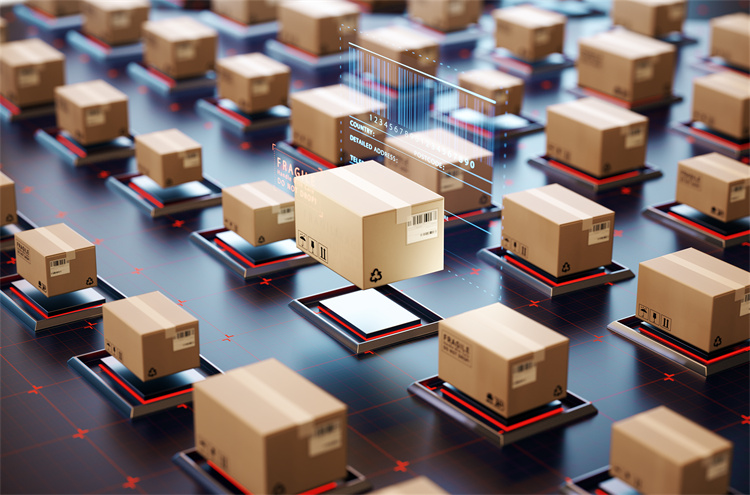How E-commerce is Transforming FMCG Market Dynamics

E-commerce has become a powerful force in the global market, valued at an impressive $26.7 trillion. Fast moving consumer products, which include everyday essentials, have experienced significant changes due to this digital shift. Understanding market dynamics is crucial for businesses in this sector. E-commerce provides new opportunities for reaching consumers and optimizing supply chains. The transformation in the FMCG sector highlights the need for companies to adapt and thrive in this evolving landscape.
The Rise of E-commerce in Fast Moving Consumer Products

Historical Context
Evolution of E-commerce
The mid-1990s marked a pivotal moment with the creation of large e-commerce sites. These platforms transformed business operations and introduced new business models. Companies began leveraging digital technology to reach consumers globally. This shift laid the groundwork for the integration of e-commerce into fast moving consumer products.
Initial Impact on Fast Moving Consumer Products
E-commerce initially influenced fast moving consumer products by altering traditional retail channels. Online platforms provided an alternative to brick-and-mortar stores. Consumers gained access to a wider variety of products. This change encouraged companies to rethink distribution strategies and embrace digital sales.
Current Trends
Growth Statistics
Fast moving consumer products have experienced exponential growth in online sales. Recent data reveals that e-commerce sales in this sector continue to outpace traditional retail. The convenience of online shopping attracts more consumers. This trend underscores the importance of digital presence for FMCG companies.
Key Players in the Market
Major players in the e-commerce market have significantly impacted fast moving consumer products. Companies like Amazon and Alibaba dominate online sales. These giants offer extensive product ranges and efficient delivery services. Their influence reshapes how consumers purchase everyday essentials.
Impact on Consumer Behavior

Changing Shopping Habits
Shift to Online Shopping
Fast moving consumer products have witnessed a significant shift in shopping habits. Consumers now prefer online platforms for purchasing everyday essentials. A survey reveals that 63% of purchases start online. This trend highlights the growing reliance on digital channels for shopping. Millennials, in particular, show a strong preference for online shopping. About 54% of millennial purchases occur exclusively online. This demographic shift emphasizes the importance of e-commerce in reaching younger consumers.
Increased Demand for Convenience
The demand for convenience drives the shift towards online shopping. Consumers seek hassle-free experiences when purchasing fast moving consumer products. Online platforms offer the advantage of shopping from anywhere at any time. Smartphones play a crucial role in this trend. Approximately 60% of online shopping time involves smartphone usage. This statistic underscores the need for mobile-friendly e-commerce solutions. Companies must adapt to meet consumer expectations for seamless and convenient shopping experiences.
Consumer Expectations
Personalization and Customization
Consumers expect personalized experiences when purchasing fast moving consumer products. E-commerce platforms provide opportunities for customization. Tailored recommendations enhance the shopping experience for consumers. Personalization helps companies build stronger relationships with their customers. Businesses can leverage data analytics to understand consumer preferences. This approach allows for more targeted marketing strategies. Meeting these expectations can lead to increased customer satisfaction and loyalty.
Speed and Efficiency
Companies must optimize their logistics to ensure timely deliveries. The integration of technology enhances the efficiency of e-commerce operations. Fast and reliable service can differentiate businesses in a competitive market. Meeting consumer expectations for speed and efficiency can drive customer retention and growth.
Business Strategies in the E-commerce Era
Adapting to Digital Platforms
Online Marketing Strategies
Businesses in the fast moving consumer products sector must embrace online marketing strategies. Digital platforms offer vast opportunities for reaching a broader audience. Companies can utilize social media channels to engage with potential customers. Influencer partnerships can amplify brand visibility. Search engine optimization (SEO) enhances online presence. Paid advertisements on digital platforms drive traffic to e-commerce sites. Email marketing campaigns provide personalized offers to consumers. These strategies increase brand awareness and customer engagement.
Supply Chain Innovations
Supply chain innovations play a crucial role in the e-commerce era. Fast moving consumer products require efficient logistics solutions. Companies must optimize inventory management to meet online demand. Automation technologies streamline warehouse operations. Real-time tracking systems improve transparency in delivery processes. Businesses can implement just-in-time inventory systems to reduce costs. Collaborative partnerships with logistics providers enhance distribution networks. Supply chain innovations ensure timely delivery of fast moving consumer products.
Leveraging Data Analytics
Understanding Consumer Insights
Data analytics provides valuable insights into consumer behavior. Fast moving consumer products companies can analyze purchasing patterns. Businesses gain an understanding of consumer preferences through data analysis. Customer feedback helps identify areas for improvement. Companies can tailor marketing strategies based on consumer insights. Data-driven decisions lead to more effective product offerings. Understanding consumer insights enhances customer satisfaction and loyalty.
Predictive Analytics for Demand Forecasting
Predictive analytics plays a vital role in demand forecasting. Fast moving consumer products companies can anticipate future trends. Data models predict consumer demand based on historical data. Accurate forecasts help optimize production schedules. Businesses can adjust inventory levels to meet anticipated demand. Predictive analytics reduces the risk of overstocking or stockouts. Companies can allocate resources efficiently to maximize profitability. Demand forecasting ensures a competitive edge in the fast moving consumer products market.
Challenges and Opportunities
Challenges Faced by FMCG Companies
Competition and Market Saturation
The fast moving consumer goods (FMCG) sector faces intense competition. Many companies compete for consumer attention. Market saturation becomes a significant hurdle. New entrants find it difficult to establish a foothold. Established brands struggle to maintain market share. Price wars often occur, affecting profitability. Differentiation becomes crucial for survival.
Cybersecurity Concerns
E-commerce platforms present cybersecurity challenges. FMCG companies handle vast amounts of consumer data. Data breaches pose a significant risk. Protecting sensitive information requires robust security measures. Cyberattacks can damage brand reputation. Regulatory compliance adds another layer of complexity. Investing in cybersecurity becomes essential.
Opportunities for Growth
Expanding into New Markets
E-commerce opens doors to new markets. FMCG companies can reach global consumers. Geographic boundaries no longer limit business expansion. Online platforms provide access to diverse demographics. Companies can tailor products for specific regions. Localization strategies enhance market penetration. Expanding into new markets offers growth potential.
Developing Sustainable Practices
Sustainability becomes a focal point for FMCG companies. Consumers demand eco-friendly products. E-commerce facilitates sustainable practices. Companies can reduce carbon footprints through efficient logistics. Sustainable packaging options attract environmentally conscious consumers. Implementing green initiatives enhances brand image. Developing sustainable practices aligns with consumer values.
JUSDA is significantly impacting the dynamics of the FMCG (Fast-Moving Consumer Goods) market through its advanced e-commerce logistics and supply chain solutions. Here are several ways JUSDA is influencing this sector:
Customized Storage and Distribution Solutions: JUSDA provides tailored storage and distribution services for well-known companies in the 3C industry, which includes consumer electronics, computers, and communication devices. This expertise can be extended to the FMCG market, ensuring efficient handling and timely delivery of goods.
E-commerce Integration: JUSDA's independently developed e-commerce storage and distribution system integrates seamlessly with mainstream international and domestic e-commerce platforms' EDI systems. This integration allows for meticulous order processing and material management, which is crucial for the fast-paced FMCG market.
Cross-border Trade Services: Through platforms like JUSDA Link and JUSDA Cross-border, the company offers comprehensive cross-border trade services. These services include professional direct special lines, first-mile logistics, and overseas warehouse distribution, which are essential for FMCG companies looking to expand their global reach.
Cloud Warehousing: JUSDA's cloud warehouse service supports multi-channel sales from businesses to consumers, achieving automated warehousing and intelligent transfer through a big data platform. This service includes unified management of Vendor Managed Inventory (VMI) and Customer Managed Inventory (CMI), which can significantly enhance the efficiency and responsiveness of FMCG supply chains.
End-to-End Supply Chain Management: JUSDA's C2M2C (Customer-to-Manufacturer-to-Consumer) model provides an end-to-end supply chain management solution. This model starts from consumer demand and influences the upstream supply chain, generating orders based on real-time demand and continuously adjusting production plans. This approach aligns well with the agile and dynamic nature of the FMCG market.
Global Network and Strategic Partnerships: JUSDA's extensive global network, including 155 service points worldwide and over 2.5 million square meters of warehousing and distribution area, ensures that FMCG companies can leverage a robust infrastructure for their logistics needs. Strategic partnerships and collaborations further enhance JUSDA's ability to provide reliable and efficient services.
Technological Integration: JUSDA's focus on building the JusLink intelligent system platform, which utilizes big data analysis, cloud platform construction, and IoT information system integration, provides FMCG companies with comprehensive information analysis and real-time collaborative operations. This technological edge helps in making precise business decisions and optimizing resource utilization.
In summary, JUSDA's advanced logistics solutions, technological integration, and global network are reshaping the FMCG market by enhancing supply chain efficiency, reducing costs, and improving the overall consumer experience.

JUSDA Solutions
To provide you with professional solutions and quotations.
E-commerce has revolutionized the fast-moving consumer goods (FMCG) sector. Companies now face the imperative to adapt to new market dynamics. The digital age demands agility and innovation. Businesses must embrace online platforms and data-driven strategies. The future of the FMCG industry looks promising. Advancements in technology, such as 5G, will drive further growth. Companies will witness increased demand for online purchases. The integration of e-commerce into FMCG operations offers vast opportunities. Businesses must remain proactive to thrive in this evolving landscape.
See Also
Revolutionizing Industries with Cloud-Based Supply Chain Solutions
Global E-commerce Success Unveiled Through Enhanced Supply Chain Visibility
Revealing Cross-Border E-commerce Supplier Partnerships Through Innovation
Tomorrow's Logistics Transformed by AI-Powered Supply Chain
Embracing Tech-Driven Supply Chain Solutions for Change Navigation
